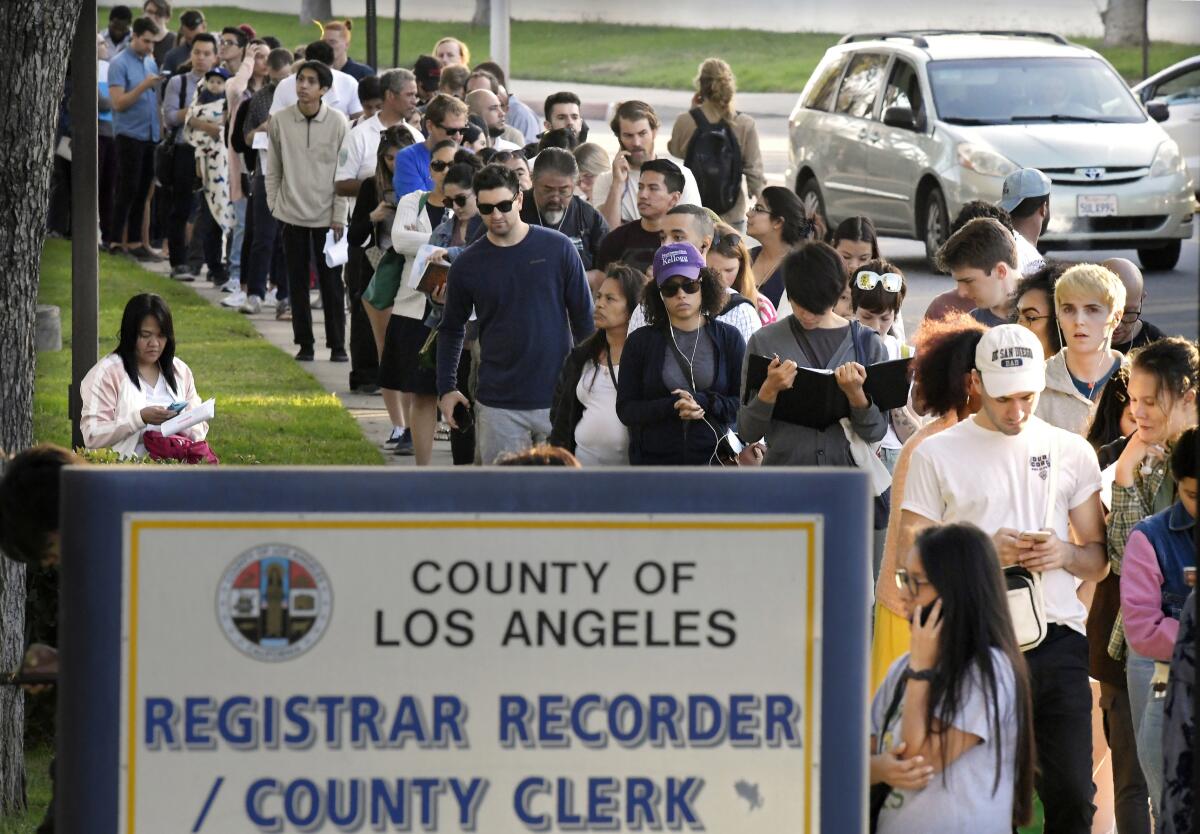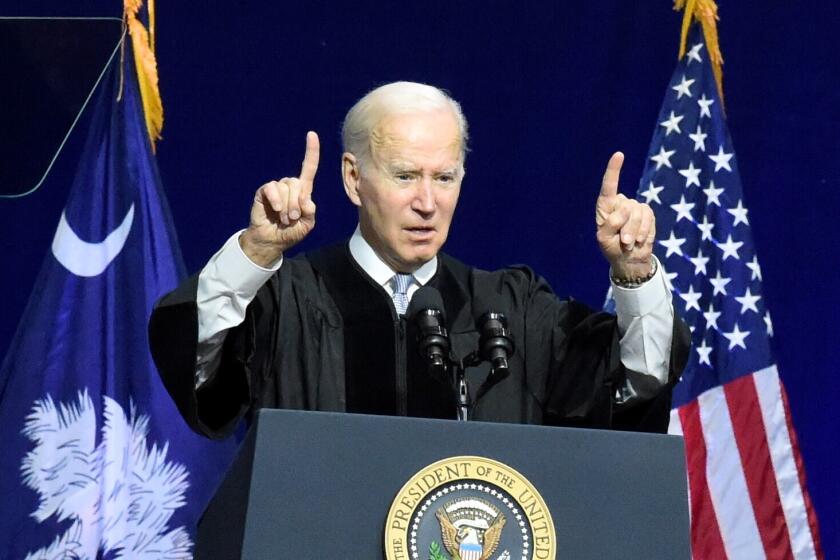Op-Ed: After 2021 tumult, here’s what it will take to protect American democracy

For those of us who care about protecting democracy, 2021 has at times resembled the sort of nightmare where you see a friend standing on a train track but your screams about the looming danger can’t be heard. The runaway train of illiberalism continues to bear down on American democracy, and the need to act could not be more urgent.
In truth, this nation avoided the worst that many anticipated might happen during and after the 2020 presidential election. Notwithstanding the “Big Lie” promoted by former President Trump and his cronies, the election, in fact, went off properly, and the candidates who received the most votes were allowed to assume their offices.
However, what the insurrection at the U.S. Capitol on Jan. 6 showed, and which subsequent congressional investigations have made even clearer, is that Trump and his minions were very much willing to try to steal the election. They considered a variety of specific plans, with some going so far as to wargame strategies for overturning his electoral loss.
Biden says world leaders no wask him if America is going to be all right and where the country’s democracy is headed.
Yet the main reason that Trump and his team were unable to pull off their schemes was because the election wasn’t all that close. Of the 59 presidential elections since 1792, there have been 13 that were narrower in the electoral college and 17 that were closer in terms of the popular vote.
Despite Trump’s failure, the right-wing anti-democratic forces are still at it. Over the last year, Republicans in state legislatures crafted various measures to make it easier to pull off what they tried to do in the 2020 election. The GOP’s anti-democratic strategy has several dimensions.
First, gerrymander so aggressively that they can win majorities of seats with minorities of votes. The template here is the Wisconsin State Assembly, where the GOP has so successfully gerrymandered the state that in 2018, they received only 47% of the Assembly votes but picked up 64% of the Assembly seats. As congressional redistricting unfolds after the 2020 census – which (by design) undercounted Democratic-leaning residents — similar efforts are underway in every state controlled by Republicans.
Second, make it harder for those same Democratic constituencies to vote. For example, by striking them from electoral rolls, or limiting the number of polling stations in heavily Democratic areas, including in communities of color, or by making it illegal to provide various forms of voting assistance. In just the first half of 2021, 18 states enacted more than 30 laws that restrict access to the vote.
Third, if all else fails and Democrats somehow still manage to get more votes, nullify the votes themselves. Trump demanded this of Georgia, Michigan and Pennsylvania lawmakers and election officials after his losses in those states in 2020. The elections officials, who upheld normal electoral practices, have in many cases been replaced by ones making few bones about their desire to ensure GOP victories occur no matter what.
Fourth, purge any Republicans critical of anti-democratic political strategies. In one swing state after another, Trump supporters are working to replace impartial election administrators with partisan hacks who, in some cases, have explicitly said they will try to enforce results on the basis of the Big Lie. Of the 10 Republicans in Congress who voted to impeach Trump after the Jan. 6 insurrection, all appear headed for the exits, either voluntarily or by primary challenges from Trump loyalists.
Republican lawmakers texted the Trump White House in panic on Jan. 6 as they were under siege, a scene the party has played down ever since.
All of this adds up to a Republican Party that has made a complete turn toward what in other countries, such as Viktor Orban’s Hungary or Recep Tayyip Erdogan’s Turkey, is known as “illiberal democracy.” Illiberal democracies are ones where elections take place, but they are rigged in the sense that not everyone has equal access to the ballot; or the ballots themselves do not get counted in impartial ways. In such nations, the purpose of elections is not to ensure that elected representatives reflect the will of the people, but rather to legitimate and consolidate the power of one party or leader.
Despite ample evidence of how this has happened in other countries, and of the explicitly stated intentions of Trumpist Republicans in the U.S., Americans continue to stand on the railroad tracks, their backs turned to the impending danger. The primary imperative, then, is for all citizens to take seriously the danger of election nullification, achieved through various means.
Taking that threat seriously means passing federal voting rights and election security bills to ensure that every citizen is empowered to vote, that every vote is properly counted and that the candidates with the most votes assume office. Unfortunately, Democrats have failed to get these bills to President Biden’s desk. They need to do so immediately, if necessary, by carrying out filibuster reform.
Perhaps even more important is the critical political work at the state and local level, where the clearest threats to our democratic system appear at present. For ordinary citizens, this means getting directly involved with local politics, because showing up to vote every four years is hardly enough.
This can include volunteering to serve as a poll worker; getting involved in the campaigns of pro-democracy candidates for governor and secretaries of state; and running for one of the thousands of local electoral administration positions across the country. Ideally, we will move toward nonpartisan professionals overseeing elections, while citizens insist that elected representatives commit to respecting ballot outcomes.
A liberal democracy in the end depends not on laws, but on the political virtues and commitments of its citizens. Those who would tear down our democratic traditions are a minority in this country, but a focused one. To defend against this deepening threat, Americans, regardless of party, will have to respond with greater fervor and dedication.
Nils Gilman is vice president of programs at the Berggruen Institute in Los Angeles.
More to Read
A cure for the common opinion
Get thought-provoking perspectives with our weekly newsletter.
You may occasionally receive promotional content from the Los Angeles Times.












